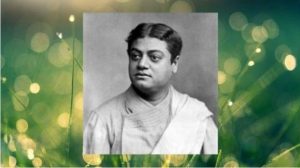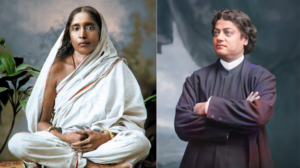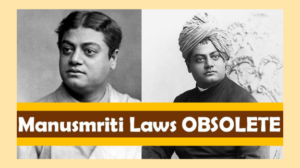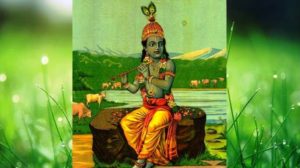Under the British rule of India, officers of the Raj, used to look upon sadhus (monks) with extreme distrust, suspecting them to be involved in conspiracies to overthrow the British government. Police officers frequently rounded up sadhus for questioning. Twice, Swami Vivekananda, who had taken the vow of Sannyas (monkhood) and who used to travel on foot from place to place across India, was caught in the police dragnet. How Swami Vivekananda escaped is a testament to his Vedantic boldness, fearlessness and ability to keep his wits about and remain calm under intense circumstances.
The following account has been narrated by Swami Vivekananda’s college classmate Nagendra Nath Gupta in the book Reminiscences of Swami Vivekananda. In it Nagendra Nath recollects the first police encounter that Swamiji had himself related to him.
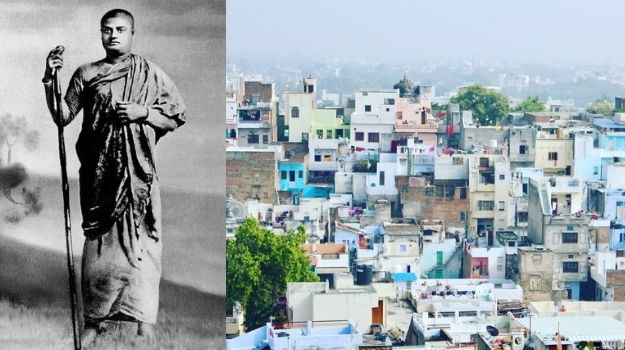
Nagendra Nath Gupta: Under the vow of poverty and mendicancy (Sannyas) Vivekananda traveled widely in northern and southern India (for a few years) and his experiences, as may be imagined, were varied.
He was in Behar (a district in the state of West Bengal) when there was great excitement in that Province on account of the marking of mango trees with lumps of mud mixed with vermilion and seed grain. In a number of districts in Behar numerous mango topes (groves) were discovered marked in this fashion.
The trustees of an empire, as the Government in this country somewhat theatrically call themselves, may have a lofty function; but they have an uneasy conscience; and the official mind was filled with forebodings of some impending grave peril.
The wonderful secret police got busy at once, and it was shrewdly surmised that the marks on the mango trees bore a family resemblance to the mysterious chapatis which were circulated immediately before the outbreak of the Mutiny (the Rebellion of 1857 to overthrow the British East India Company).
The villagers, frightened out of their wits by the sudden incursion of armed and unarmed authority in their midst, denied all knowledge of the authorship of these sinister marks. Suspicion next rested upon the itinerant sadhus (monks) wandering all over the country; and they were arrested wholesale for some time, though they had to be let off for want of evidence, and the recent facilities of regulations and ordinances did not then exist. It was found out afterwards that the marking of mango trees was merely an agricultural mascot for a good mango or general crops.
Vivekananda (in those days of his wandering monk-hood) used to get up early in the morning and trudge along the Grand Trunk Road or some village path until some one offered him some food, or, the heat of the sun compelled him to rest under a roadside tree.
One morning as he was tramping along as usual, he heard a shout behind him calling upon him to halt. He turned round and saw a mounted police officer, bearded and in full panoply, swinging a switch and followed by some policemen. As he came up, he inquired in the well-known gentle voice affected by Indian policemen who Vivekananda was.
“As you see, Khan Saheb,” replied Vivekananda, “I am a sadhu.”
“All sadhus are badmashes (rogues),” sententiously growled the Sub-Inspector of Police.
As policemen in India are known never to tell an untruth such an obvious fact could not be disputed.
“You come along with me, and I shall see that you are put in jail.” boomed the police officer. “For how long?” softly asked Vivekananda. “Oh, it may be for a fortnight, or even a month.”
Vivekananda went nearer to him and in an ingratiating and appealing voice said, “Khan Saheb, only for a month? Can you not put me away for six months, or at least three or four months?” The police officer stared, and his face fell. “Why do you wish to stay in jail longer than a month?” he asked suspiciously.
Vivekananda replied in a confidential tone, “Life in the jail is much better than this. The work there is not hard compared with this wearisome tramping from morning till night. My daily food is uncertain, and I have often to starve. In the jail I shall have two square meals a day. I shall look upon you as my benefactor if you lock me up for several months.”
As he listened, a look of disappointment and disgust appeared on the Khan Saheb’s face, and he abruptly ordered Vivekananda to go away.
 Story 2: How Swami Vivekananda Outwitted Police in the British Raj – The second incident of how Swami Vivekananda evaded persecution by the British police, who used to routinely arrested monks for sedition.
Story 2: How Swami Vivekananda Outwitted Police in the British Raj – The second incident of how Swami Vivekananda evaded persecution by the British police, who used to routinely arrested monks for sedition.

